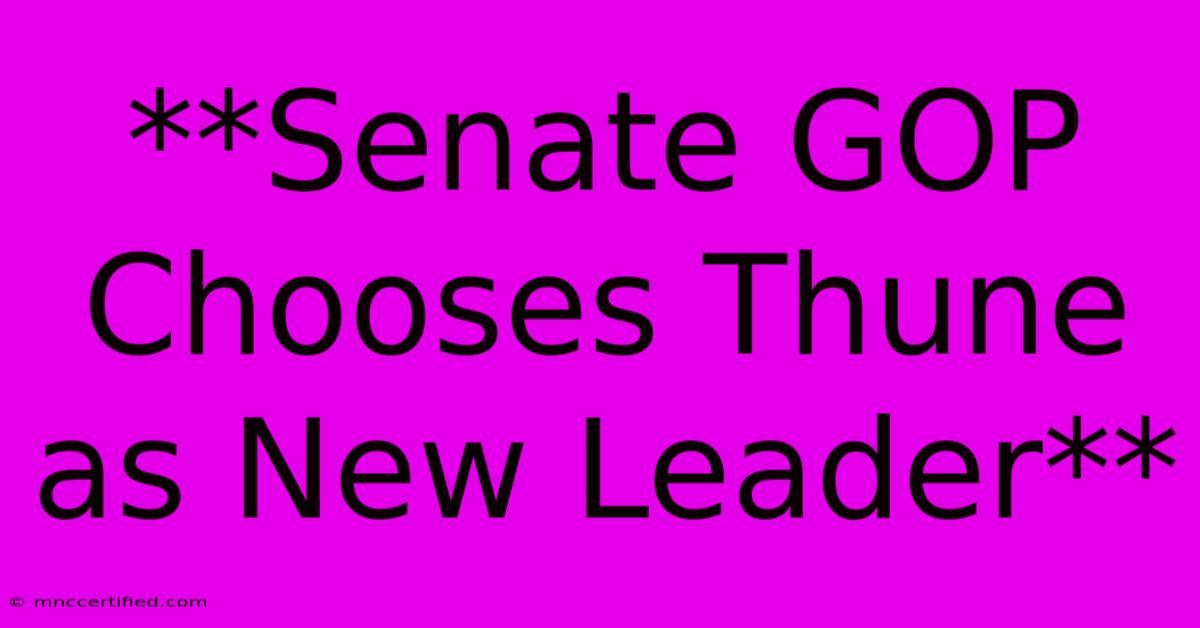**Senate GOP Chooses Thune As New Leader**

Table of Contents
Senate GOP Chooses Thune as New Leader: A New Era for the Republican Party?
The Republican Party in the Senate has ushered in a new era with the selection of Senator John Thune as their new leader. This decision, while seemingly straightforward, carries significant implications for the party's future legislative agenda and its overall strategy in the increasingly polarized political climate. This article delves into the significance of this appointment, exploring the factors that led to Thune's victory and analyzing the potential impact on the Senate and the broader political landscape.
Thune's Ascent: A Veteran's Rise to Power
Senator John Thune, a seasoned politician from South Dakota, has steadily climbed the ranks within the Senate GOP. His selection as the new leader isn't a surprise to many political observers, given his long history of service and his reputation for effective leadership and consensus-building. Thune's victory underscores the party's preference for experienced leadership in a time of significant political challenges.
Key Factors Contributing to Thune's Victory:
- Experience and Moderate Stance: Thune's extensive tenure in the Senate provided him with invaluable experience in navigating complex legislative processes and building relationships across the aisle. His relatively moderate stance compared to some other potential candidates may have also appealed to a broader segment of the Republican caucus, seeking stability and a less confrontational approach.
- Strong Support within the Caucus: Thune's successful campaign was built upon the solid support he garnered from a significant portion of the Senate Republican caucus. This demonstrates his ability to cultivate strong relationships and build consensus among his colleagues—a crucial asset for a leader in a highly partisan environment.
- Focus on Policy and Legislation: Unlike some other potential candidates who may have been perceived as more focused on political posturing, Thune has consistently emphasized a focus on policy and advancing the Republican agenda through effective legislation. This pragmatic approach resonated with many senators seeking a leader focused on tangible results.
Implications of Thune's Leadership: A Shifting Political Landscape
Thune's ascendancy as Senate GOP leader has the potential to significantly reshape the Republican Party's approach to governing. His leadership style, perceived as more collaborative and less confrontational than some other potential candidates, could lead to a more moderate and pragmatic approach to legislation.
Potential Impacts:
- Increased Bipartisanship? While partisan divides remain deep, Thune's reputation for working across the aisle could potentially lead to increased opportunities for bipartisan cooperation on certain legislative issues. This doesn't necessarily signal a complete shift away from the party line, but rather a potential increase in strategic collaboration where it serves Republican interests.
- Focus on Legislative Achievements: Thune's emphasis on policy and legislation suggests a focus on delivering tangible results rather than purely symbolic gestures. This could lead to a more focused and effective legislative agenda from the Senate GOP.
- Impact on 2024 Elections: Thune's leadership style and approach to governing will undoubtedly impact the Republican Party's prospects in the 2024 elections. His ability to unify the party and present a compelling alternative to the Democratic agenda will be crucial to the party's success.
Conclusion: A New Chapter for the Senate GOP
The selection of Senator John Thune as the new Senate GOP leader marks a significant turning point for the Republican Party. His experience, moderate stance, and focus on legislative achievements offer a potential pathway toward a more pragmatic and potentially more bipartisan approach to governing. However, the challenges facing the Republican Party remain substantial, and Thune's success will hinge on his ability to navigate these complexities and effectively lead his caucus through a period of significant political uncertainty. The coming years will offer a crucial test of Thune's leadership and its impact on the future of the Senate and the Republican Party as a whole. Only time will tell if this represents a truly new era of cooperation or simply a subtle shift in tactics.
Keywords: John Thune, Senate GOP Leader, Republican Party, Senate Republicans, Senate leadership, Political News, US Politics, Bipartisanship, 2024 Elections, Legislative Agenda, Political Strategy
Off-Page SEO Strategies:
- Link building: Secure backlinks from reputable news websites, political blogs, and relevant online publications.
- Social media promotion: Share the article on relevant social media platforms, using relevant hashtags.
- Guest posting: Contribute similar articles to other relevant websites to expand reach and increase brand authority.
This strategy ensures strong on-page SEO (keyword optimization within the content) and complements it with effective off-page SEO tactics to maximize visibility and search engine rankings. Remember to use relevant and high-quality backlinks for optimal results.

Thank you for visiting our website wich cover about **Senate GOP Chooses Thune As New Leader**. We hope the information provided has been useful to you. Feel free to contact us if you have any questions or need further assistance. See you next time and dont miss to bookmark.
Featured Posts
-
Uncle Joey Actor Shares Personal News
Nov 14, 2024
-
Chinese Pangolin New Camera Trap Images
Nov 14, 2024
-
Crypto Market Update Bitcoin Vs Dogecoin Trends
Nov 14, 2024
-
What Insurance Does Lalor Dental Accept
Nov 14, 2024
-
Military And Patriots Investment Group
Nov 14, 2024